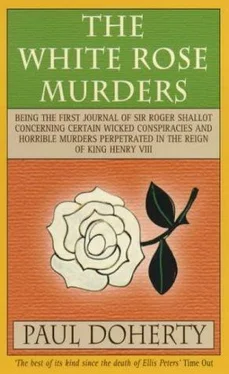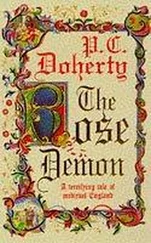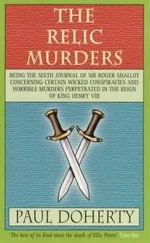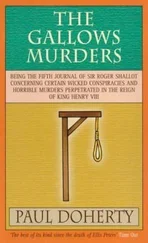Paul Doherty - The White Rose murders
Здесь есть возможность читать онлайн «Paul Doherty - The White Rose murders» весь текст электронной книги совершенно бесплатно (целиком полную версию без сокращений). В некоторых случаях можно слушать аудио, скачать через торрент в формате fb2 и присутствует краткое содержание. Жанр: Исторический детектив, на английском языке. Описание произведения, (предисловие) а так же отзывы посетителей доступны на портале библиотеки ЛибКат.
- Название:The White Rose murders
- Автор:
- Жанр:
- Год:неизвестен
- ISBN:нет данных
- Рейтинг книги:4 / 5. Голосов: 1
-
Избранное:Добавить в избранное
- Отзывы:
-
Ваша оценка:
- 80
- 1
- 2
- 3
- 4
- 5
The White Rose murders: краткое содержание, описание и аннотация
Предлагаем к чтению аннотацию, описание, краткое содержание или предисловие (зависит от того, что написал сам автор книги «The White Rose murders»). Если вы не нашли необходимую информацию о книге — напишите в комментариях, мы постараемся отыскать её.
The White Rose murders — читать онлайн бесплатно полную книгу (весь текст) целиком
Ниже представлен текст книги, разбитый по страницам. Система сохранения места последней прочитанной страницы, позволяет с удобством читать онлайн бесплатно книгу «The White Rose murders», без необходимости каждый раз заново искать на чём Вы остановились. Поставьте закладку, и сможете в любой момент перейти на страницу, на которой закончили чтение.
Интервал:
Закладка:
'Never you mind!'
He scooped me up in his great arms, barking at me to make myself presentable and half-carried me back into the taproom. On his orders the tapster broached a good cask of wine and brought across a bowl of water. Joachim cleaned my face, wiping dirt from the bruises whilst I greedily gulped the thick red claret. Perhaps I should have known there was something wrong; the taproom was strangely quiet, the slattern had disappeared and the landlord seemed too busy to care.
'Do you need any more help?' Joachim asked.
'No,' I muttered.
'Then I'll be off!' the friar boomed. 'I have to visit the shrine of the Blessed Dionysius.'
Despite my injuries, I gaped up at him.
'Dionysius?' I queried. 'Who is he?'
'St Denis, of course!' the friar joked back. 'I use the Latin name. You know the monastery?'
He shook my hand and strode out of the tavern. I never saw him again, the man who saved my life. (Do you know, until fat Henry crushed the monasteries, I always had a soft spot for Franciscans. Not just because of Joachim's kindness but that chance encounter put me on the road to solving Selkirk's riddles and the horrible murders they caused.) Once Joachim had gone, the landlord showed renewed interest in me. He came and stood over me, a mock-tragic expression on his face.
'Monsieur, you were attacked?'
'Oh, no,' I sarcastically retorted, 'just some French bravos welcoming me to this Godforsaken city!' I got up. 'I must go to my chamber.'
'Monsieur!' The villain stepped in front of me, two of the thugs he always kept in the tavern to crack the heads of noisy revellers now standing behind him.
'Monsieur, your room has been ransacked. By whom I do not know. Your baggage and silver, they have gone!'
'Hell's teeth!' I snarled but the landlord, the two thugs close to his shoulder, screamed his innocence. He peered closer at me and asked what an Englishman was doing in Paris.
'This Selkirk,' he jibed, 'were you his bum boy?'
[At the time I didn't know what he was talking about. I always was, and have been ever, a devoted admirer of the fairer sex, but after you have made the acquaintance of men like Christopher Marlowe, you really can't trust anyone. Oh, yes, I knew Marlowe the playwright and helped him stage his play Edward II. Poor Kit! A good poet but a bad spy. I was with him, you know, when he died. Stabbed to death in a tavern brawl over a pretty boy.]
Ah, well, I had to leave Le Coq d'Or and found myself penniless, freezing in a Paris alleyway without baggage or silver. I thought of going to St Denis, but to what use? More pressing was the need to find shelter, food and extra clothing. I thought of following Joachim but I felt tired, exhausted after my beating. Somehow, my visit to the Sign of the Pestle had caused the attack on me so I dared not go back there. I crouched in that alleyway and prayed for Benjamin to come.
Poor old Shallot! Alone in Paris, in a foreign city on the brink of winter, penniless, hungry, with not an item I could call my own except the clothes I stood up in. At first, I lived on my wits. I became a story-teller: painting my face, filching a gaudily embroidered robe and, not being versed in the French tongue, pretending I was a traveller lately returned from seeing the fables of India and Persia. I took a position on the edge of one of the bridges across the Seine and told, in halting fashion, stories about forests so high they pierced the clouds.
'These,' I cried, 'are inhabited by horned pygmies who move in herds, and who are old by the time they are seven!'
I earned a few sous so I became more fantastical, maintaining I had met Brahmins who killed themselves on funeral pyres; men with monkeys' heads and leopards' bodies; giants with only one eye and one foot who could run so fast they could only be caught if they fell asleep in the lap of a virgin. As the days passed, my wits sharpened and my command of the tongue improved, as did my stories. I had met Amazons who cried tears of gold, panthers which could fly, trees whose leaves were made of wood, snakes three hundred feet long with eyes of blazing sapphire.
At last both the sous and the stories ran out so I sold the cloak and gathered a few objects: bones, shards of pottery and the occasional rag. I became a professional relic-seller. The proud possessor of a fragment of the Infant Jesus's vest, a toy he had once played with (Benjamin would have been proud of that), and a hair from St Peter's beard which could cure the ague or a sore throat. I had the arm of Aaron and, when someone burnt that as a joke, changed my tale and said the ashes were from a fire over which the martyr of St Lawrence died. I earned a few sous but not enough. Paris was full of rogues, card-sharps, brigands, footpads, dice-coggers, pimps, ponces, horse-stealers, bruisers, coin-clippers -the true children of wing-heeled Mercury, the lying patron of thieves and politicians. In a word, the competition became too intense and, in the reeking runnels and smelly alleyways of Paris, I began to starve.
Now Paris may well be the inspiration of poets and troubadours but I don't remember it as the fabled Athens of the West. All I recollect is a grey, sombre sky and the dark Seine rushing under the bridges; tall, sharp-gabled houses which sprang up from the cobbles and leaned crazily together, storey thrust out above storey; the narrow, winding streets of the Latin Quarter; the pell-mell of ascending gables and tinted roof tiles, the gables of their lower storeys sculpted into fantastic shapes of warriors or exotic animals. Oh, yes, I got to know these well as I slunk past like a hungry fox in a deserted kitchen yard. Above me, the gaily painted signs of the taverns and food shops creaked in the wind and mocked my hunger. At each crossroads the stone fountains with their precious supply of water were guarded by men-at-arms. On one occasion I stopped to pray before the statue of a saint at a street corner and noticed the lamp burning before it. I stole the candle from its socket and sold it for a crust of bread and a stoup of water from an ale wife.
The fourth Sunday in Advent came and went. Benjamin had told me he would return to Le Coq d'Or; every morning and each evening I went there but no Benjamin. I cursed him for a fool. I tried to speak with the landlord but was driven off for what I seemed – a ragged, evil-smelling beggar. My mind, once sound as a bell, became muddled and confused. I thought I saw Selkirk and his damned doggerel tripped through my brain:
Three less than twelve should it be, Or the King, no prince engendered he!
[The vicar wipes away a tear. The bastard had better not be laughing!]
I slept in graveyards or along the steps of the churches and woke hollow-eyed and sick with hunger to the oaths of the men-at-arms, the mocking jeers of cheapjacks and mountebanks, the clatter of hooves and the crazy jangle and flurry of hundreds of city bells. London reeks but Paris is much worse. The stench there is terrible; the alleys and streets caked with mud and shit, and made more pungent by other offal which smelt as if barrels of sulphur had been spilt along every alleyway.
I lived as a beggar, scrounging what I could, but then winter came, not only early but cruelly, one of the sharpest, coldest winters for decades. The roads became clogged and food in Paris began to run out. Even the fat ones, the lords of the soil, the truculent men-at-arms and the tight-waisted, square-bodied wives of the bourgeois, began to starve. The markets became empty and what food was left in Paris was prized more highly than gold. The old died first, the beggars and the maimed; they just froze as they leaned gasping against urine-stained walls. Then the babies, the young and the weak. Snow fell in constant sharp, white flurries. The Seine froze over and the nearby forests, usually a source of food, now gave birth to a new nightmare. Great, shaggy-haired, grey wolves banded together, left the frozen darkness of the trees and crossed the Seine in packs, to hunt in the suburbs. They attacked dogs and cats and savaged and maimed the crippled beggars. They even dug up graveyards, dragging out the freshly interred bodies. A curfew was imposed, archers armed with loaded arbalests patrolled the streets and thick webs of chains were dragged across the entrances to the main thoroughfares.
Читать дальшеИнтервал:
Закладка:
Похожие книги на «The White Rose murders»
Представляем Вашему вниманию похожие книги на «The White Rose murders» списком для выбора. Мы отобрали схожую по названию и смыслу литературу в надежде предоставить читателям больше вариантов отыскать новые, интересные, ещё непрочитанные произведения.
Обсуждение, отзывы о книге «The White Rose murders» и просто собственные мнения читателей. Оставьте ваши комментарии, напишите, что Вы думаете о произведении, его смысле или главных героях. Укажите что конкретно понравилось, а что нет, и почему Вы так считаете.












